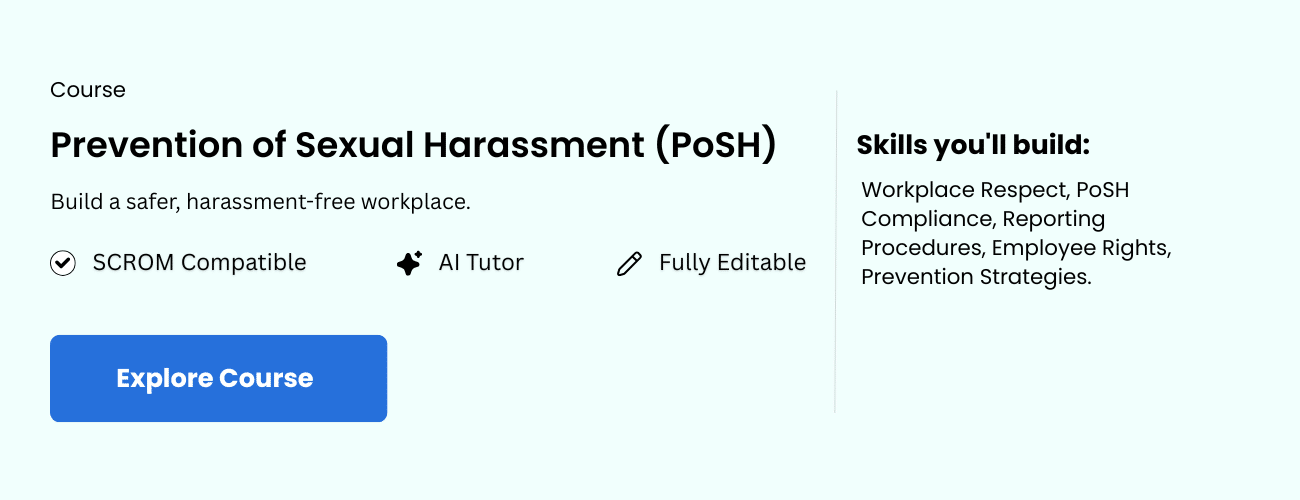
THANK YOU
FOR YOUR INFORMATION
One of our expert will be in touch with you…

Creating an effective POSH training program in the online environment is essential for ensuring compliance with the Sexual Harassment of Women at Workplace (Prevention, Prohibition and Redressal) Act, 2013. With the increase in remote work and digital learning, organizations need to adapt their training programs to deliver an impactful and legally compliant experience online.
This blog walks you through five clear steps to design a high-quality online POSH training for employees course that not only informs but also empowers employees to build a safe and respectful work culture.
Before building your online POSH training, it’s vital to thoroughly understand the legal requirements set forth by the POSH Act. This includes:
Once this is clear, define the learning objectives: what should employees know, feel, and do after completing the course?
An Online POSH training platform must be user-friendly, accessible, and scalable. Look for platforms with the following features:
Cloud-based LMS solutions are ideal as they allow for continuous access, tracking, and automation of updates.
Must Read: 5 Best POSH Training Courses for Employees in India
One of the biggest pitfalls of Prevention of Sexual Harassment (POSH) training is making it feel like a legal formality. Effective POSH training should use:
Keep the tone professional yet empathetic to address the sensitivity of the subject.
Instead of one-time compliance training modules, build a training ecosystem that encourages continuous learning. Consider features such as:
These elements make the POSH training program more relatable and actionable.
Measure the effectiveness of your online POSH training with post-course assessments, anonymous feedback surveys, and engagement tracking. Use these insights to:
Regular audits and content reviews ensure your training stays relevant and legally compliant.

The Paradiso Course Catalog offers 100+ fully editable, SCORM-compatible courses that seamlessly integrate with any existing LMS, providing a ready-to-deploy solution for POSH compliance training. Organizations can access a professionally designed POSH compliance course that covers essential topics including sexual harassment definitions, bystander intervention, gender sensitivity, redressal mechanisms, and handling false complaints—all structured with interactive case studies and group activities.
What makes the catalog stand out is its flexibility and customization—courses can be tailored in real-time to match company-specific policies and industry requirements. Each course features an integrated AI Tutor that guides learners through complex topics and answers questions in real-time, enhancing engagement and retention.
Beyond POSH training, the catalog spans 25+ key areas including workplace safety, compliance, business skills, and professional development, making it a comprehensive solution for all training needs. The LMS automatically tracks completion, generates compliance reports, and issues certificates to maintain audit-ready records.
With ready-to-use content and intelligent delivery, the Paradiso Course Catalog transforms POSH training from a compliance checkbox into an active step toward building a safer, more inclusive workplace culture.
Yes, as long as the training content meets the requirements of the POSH Act and includes assessments and certificates for compliance tracking, online POSH training is legally valid.
Best practice suggests conducting POSH training annually, along with refresher sessions or updated modules when changes in laws or workplace conditions occur.
Absolutely. Industry-specific scenarios and guidelines can make training more relevant and impactful for employees.
All employees, including contract workers, interns, volunteers, and the Internal Complaints Committee (ICC) members, must undergo POSH training.
Non-compliance can lead to legal penalties, reputational damage, and ineligibility for government tenders or licenses.
By following these five strategic steps, your organization can create a powerful, engaging, and effective POSH training experience that meets compliance requirements while also fostering a culture of respect and safety. An optimized POSH training program empowers both management and employees to take proactive roles in preventing and addressing sexual harassment at work.
Invest in a scalable, interactive, and legally sound Online POSH training solution today to protect your people and your brand.